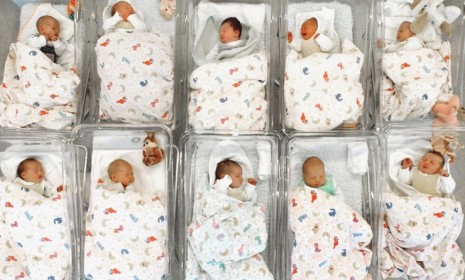The mother who birthed five babies in five minutes
How Christian missionary Carrie Jones had a delivery-room experience for the record books

A free daily email with the biggest news stories of the day – and the best features from TheWeek.com
You are now subscribed
Your newsletter sign-up was successful
There's no knowing what to expect when a mom-to-be shows up at the maternity ward. Some women breeze through labor and are holding their newborns within hours. Their less fortunate sistren — who have to power through agonizing ordeals that stretch from one day into the next — might not want to read the story of Carrie Jones. The Christian missionary, who lives in Papua New Guinea, gave birth last week while in Texas to one of the nation's first set of quintuplets in 2012 — in five minutes. How can that be? Here, a brief guide:
How can five babies be safely delivered so quickly?
Well, for one thing, they were delivered by emergency caesarian section. But, even so, it took a lot of planning. Medical teams, including more than 50 specialists, nurses, therapists, and technicians, planned for the births for months after Jones, 34, and her husband, Gavin, learned they were expecting quintuplets. Each baby had a designated team, and the staff members, each issued a pager, held weekly drills to prepare. A color-coded system made sure each newborn got the care and supplies he or she needed. "A birth like this takes a village," said Dr. Patricia Santiago-Munoz, who delivered the babies at the University of Texas Southwestern Medical Center in Dallas.
The Week
Escape your echo chamber. Get the facts behind the news, plus analysis from multiple perspectives.

Sign up for The Week's Free Newsletters
From our morning news briefing to a weekly Good News Newsletter, get the best of The Week delivered directly to your inbox.
From our morning news briefing to a weekly Good News Newsletter, get the best of The Week delivered directly to your inbox.
Are they all healthy?
Yes. The three boys and two girls — Will Edward, David Stephen, Seth Edward, Marcie Jane, and Grace Elise — are doing as well as expected, given that they were born at 27 weeks and five days, roughly three months premature. They ranged in weight from 1 pound, 12 ounces to 2 pounds, 11 ounces, and in length from 12.5 inches to 15.5 inches. Seth is on a special ventilator because he has trouble breathing, and will probably have to remain in the hospital until Nov. 3, his mom's official due date. Will, David, and Marcie are on nasal prongs to help them breathe, and Grace is on a mechanical ventilator, but "very stable," like her siblings.
How rare are quintuplets?
Typically, about 12 sets are born in the U.S. each year, though federal health officials recorded 16 sets in 2009. The Joneses — missionaries in Papua New Guinea — had difficulty getting pregnant again following the birth of their 8-year-old son, Isaac, and Carrie had been using hormone injections (but not IVF) to help her conceive. "Isaac's been praying for five years for a sibling, and so I fully blame him," Carrie Jones said. "These five were a huge surprise." Her husband, a helicopter pilot, said: "The intent was to have one."
A free daily email with the biggest news stories of the day – and the best features from TheWeek.com
Sources: CBS News, CNN, Daily Mail, Mommyish,San Francisco Chronicle


